Data-driven decision making : an adoption framework
Author(s)
Weigert, Thilo
DownloadFull printable version (1.814Mb)
Other Contributors
Sloan School of Management.
Advisor
Erik Brynjolfsson.
Terms of use
Metadata
Show full item recordAbstract
The ever increasing abundance of data and advancement of new technologies opens up new possibilities for companies in all segments and causes entire industries to rethink their business models. While there are a multitude of ways for companies to capture these new data-enabled opportunities, an obligatory first step is to make decisions more data-driven, and less guided by intuition. While the positive effects of data-driven decision making on a range of business performance metrics have been proven empirically, the adoption of corresponding practices is rapid but uneven across industries. Based on examples of the manufacturing and healthcare industries, the rate, speed and effectiveness of a company-wide adoption of data-driven decision making is impacted by factors that include leadership commitment, organization and culture, selection of data, skill depth of both analytics users and consumers, and a company's ability to go beyond the mere collection and analysis of data. While in manufacturing, the main use cases revolve around incremental increases in efficiency, safety and performance, data-driven decision making in healthcare is still in its infancy and starting to uncover exciting use cases with the potential to impact millions of lives. The more a company embraces data-driven decision making, the more its locus of decision making tends to become centralized. However, this is also largely dependent on the type of decision, the type of data used, as well as the decision's complexity, impact and idiosyncrasy. While there are decisions that can and will be fully centralized and automatized, there will also always be tacit decisions that will fully remain within humans, and decisions that are highly data-driven, but still allow for significant human value contribution. Data powers insights, decision and actions, and we are only scratching the surface of the value that can be created, captured and redistributed through data-driven decision making.
Description
Thesis: S.M. in Management Studies, Massachusetts Institute of Technology, Sloan School of Management, 2017. Cataloged from PDF version of thesis. Includes bibliographical references (pages ix-xii).
Date issued
2017Department
Sloan School of ManagementPublisher
Massachusetts Institute of Technology
Keywords
Sloan School of Management.